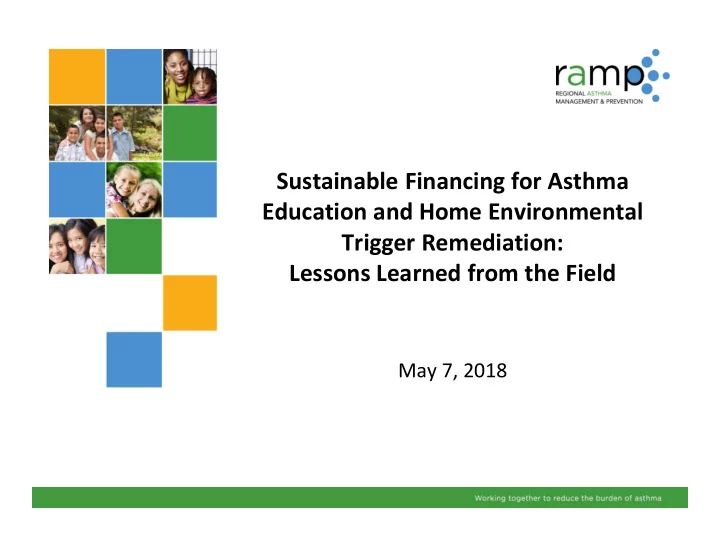

Sustainable Financing for Asthma Education and Home Environmental Trigger Remediation: Lessons Learned from the Field May 7, 2018
About RAMP • RAMP reduces the burden of asthma through a comprehensive approach, ranging from clinical management to environmental protection • We collaborate, coordinate, share resources, and advocate to reduce inequities, strengthen asthma prevention efforts, improve management for all communities • Goals: – Improving indoor air quality in housing and schools – Reducing outdoor air pollution – Linking clinical care with prevention
Technical Details
Technical Details
Technical Details
Today’s Webinar • Introductions and overview • Summary of lessons learned • Michigan • New Mexico • Technical assistance resources • Q & A
How Do We Reduce the Burden of Asthma? Utilize a broad and comprehensive approach aligned with NIH’s Guidelines for the Diagnosis and Management of Asthma (EPR-3): • Assessment of disease severity and control • Comprehensive pharmacologic therapy • Patient education • Environmental control measures to avoid or eliminate factors that contribute to asthma onset and severity
What Does Asthma Education Look Like? Delivered by a variety of professionals in a variety of settings, asthma education includes information about: • Basic asthma facts • Proper use of medications • Self-management techniques/self-monitoring skills • Actions to mitigate or control environmental factors that exacerbate symptoms
What Should Environmental Control Measures Look Like? Home environmental trigger remediation interventions involve home visits by trained personnel to conduct two or more activities, including: • Assessment of the home environment • Education about the home environment • Changes to the indoor environment to reduce exposure to asthma triggers
The Health Impact Patient education and environmental control measures: • Reduce ED visits and hospitalizations • Improve asthma control • Decrease symptom frequency • Decrease work and school absenteeism • Improve quality of life
The Economic Impact Both asthma education and environmental remediation have a positive Return on Investment • One asthma education program targeting high-risk children saved $11.22 for every $1 spent • Minor to moderate environmental remediation provides a ROI of $5.30- $14.00
The Equity Impact • There are significant asthma disparities • Social and environmental inequities – especially housing – contribute to these disparities • Asthma education and environmental trigger remediation is one of many ways to address these inequities
From Evidence to Practice: Sustaining Asthma Education and Home Trigger Remediation in the Home How?
Lessons Learned
Lessons Learned • Pursuing multiple policies and funding streams • Balancing top-down and bottom-up approaches • Partnership infrastructure and related resources • Making complex information accessible • Deciding to take a broad or disease-specific approach • Navigating challenges related to non-licensed professionals
Pursuing Multiple Policies and Funding Streams
Pursuing Multiple Policies and Funding Streams U.S. Environmental Protection Agency
Balancing Top-Down/Bottom-Up Approaches • Political factors • State financial and structural factors • The managed care landscape
Partnership Infrastructure and Resources • Partnership Infrastructure • Diverse Perspectives and Expertise • Funding to Support Partnerships
Making Complex Information Accessible
Taking a Broad or Disease-Specific Approach VS.
Navigating Challenges of Non-Licensed Professionals • Qualifications • Supervision • Workforce capacity and availability
Lessons Learned Full document: http://www.rampasthma.org/archives/14893 • Pursuing multiple policies and funding streams • Balancing top-down and bottom-up approaches • Partnership infrastructure and related resources • Making complex information accessible • Deciding to take a broad or disease-specific approach • Navigating challenges related to non-licensed professionals
Q & A
Thank You! • Lessons Learned document: http://www.rampasthma.org/archives/14893 • Contact us – Joel Ervice – joel@rampasthma.org – Tisa Vorce – VorceT@michigan.gov – Diana Wilkerson – Diana.Wilkerson@state.nm.us – Amanda Reddy – areddy@nchh.org
Recommend
More recommend